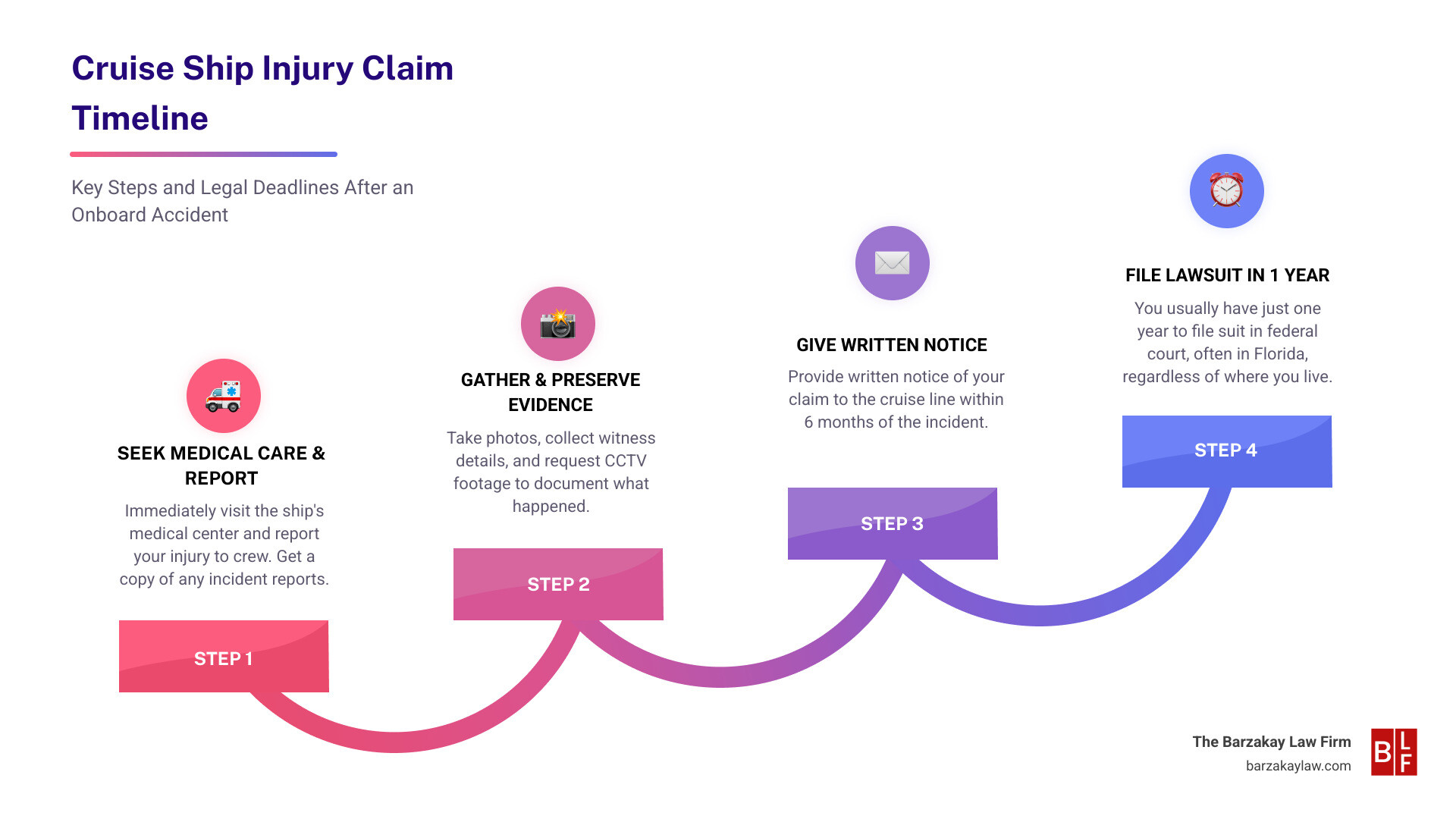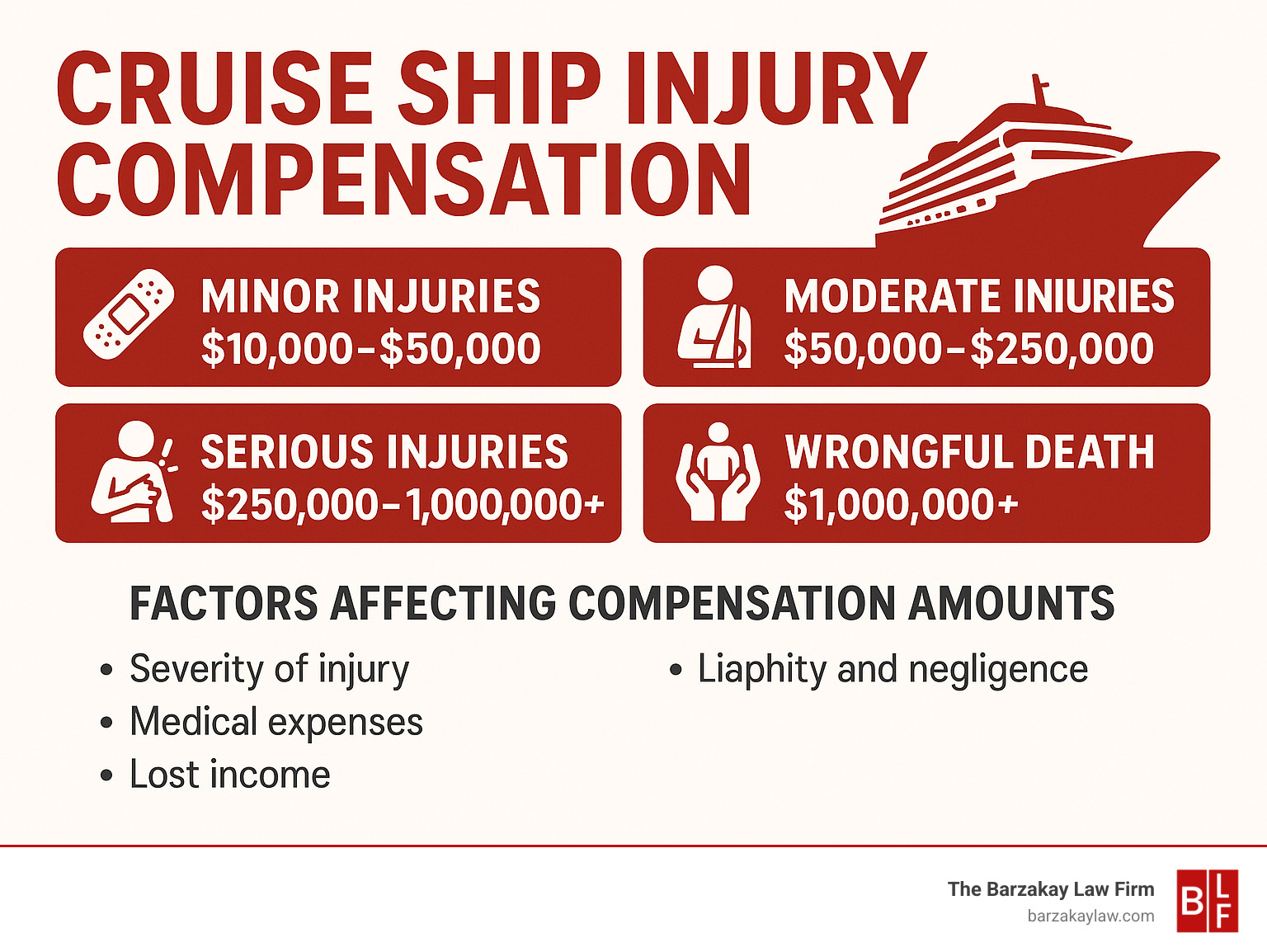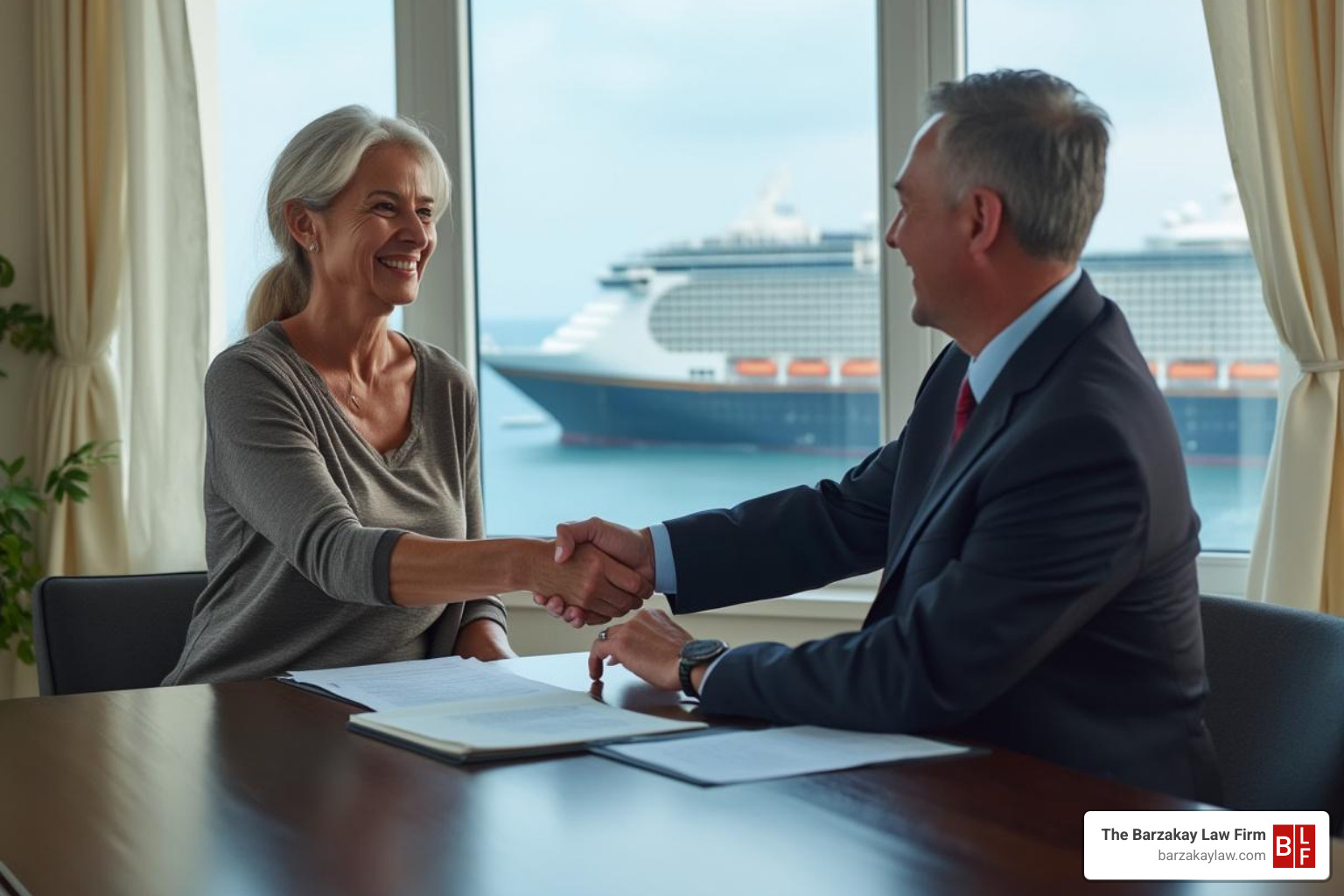Why Cruise Ship Injuries Require Special Legal Knowledge
A cruise ship injury lawyer handles the unique legal challenges that arise when passengers or crew members are hurt at sea. These cases fall under maritime law, not regular personal injury law, and involve strict deadlines and complex jurisdiction rules.
Quick Answer – What You Need to Know:
- Who: Maritime attorneys who understand admiralty law and federal court procedures
- When: Contact within 6 months (notice requirement) and file suit within 1 year
- Where: Usually must file in Florida federal court, regardless of where you live
- What: Handle injuries from slip-and-falls, food poisoning, assaults, excursion accidents
- Why: Cruise contracts limit your rights and shorten normal legal deadlines
- How: Work on contingency fees (no upfront costs) and offer free consultations
More than 14 million passengers take cruises each year, but few understand their legal rights when things go wrong. Cruise lines use foreign ship registration, forum selection clauses, and shortened deadlines to limit their liability.
The biggest mistake? Waiting too long to act. While most personal injury cases give you years to file a lawsuit, cruise ship cases typically require written notice within 6 months and a lawsuit within just 1 year.

Immediate Actions to Protect Your Rights Afloat
When you’re injured on a cruise ship, what you do in those first critical moments can completely change the outcome of any legal case. Unlike accidents at home where you have years to figure things out, cruise ship injuries come with incredibly tight deadlines – a six-month notice requirement and a one-year statute of limitations.

Seek medical attention first – your health always comes before anything else. Once you’re stable, report the incident immediately to ship personnel and insist on filling out that incident report. Get your copy before you leave the ship.
Document everything with photos – the accident scene, your injuries, any hazardous conditions. Collect witness information from anyone who saw what happened. People scatter quickly on cruise ships.
If you’re dealing with a situation similar to a boating accident personal injury case, the same principles apply, but cruise ships add extra layers of complexity because of maritime law.
Collect & Preserve Critical Evidence
Evidence vanishes fast on cruise ships. Take photos immediately – capture the exact spot where you got hurt, any warning signs (or lack of them), wet floors, broken equipment, poor lighting. Don’t forget to photograph your injuries and any damaged clothing.
Request that security footage right away. Ask ship security in writing to preserve any CCTV footage of your accident. Start keeping an injury journal documenting your pain levels, symptoms, and how the injury affects your activities.
Once you get home, see your own doctor immediately. The ship’s medical staff work for the cruise line – you need an independent medical evaluation.
Report, Document, Seek Care—In That Order
The sequence matters. Report first, then document, then seek comprehensive care. Keep copies of all medical records from the ship and the incident report form. Keep getting medical treatment once you’re back home – gaps in medical care can hurt your case.
What Really Causes Cruise Ship Injuries?
Cruise ships present unique dangers that don’t exist on land. The combination of moving vessels, international waters, and thousands of passengers creates a perfect storm for accidents.
More than 14 million passengers take cruises annually, and many injuries result from preventable negligence rather than unavoidable maritime risks.
Most Common Causes:
- Slip and fall accidents – Wet decks, unmarked slippery surfaces, inadequate warning signs
- Food poisoning – Contaminated food, unsanitary conditions, poor food handling
- Assault and crimes – Sexual assault is consistently the most reported crime aboard cruise ships
- Shore excursion accidents – Bus crashes, equipment failures, inadequate safety briefings
- Weather-related incidents – Failure to secure areas during rough seas
- Mechanical failures – Elevator malfunctions, broken railings, equipment defects
- Crew negligence – Inadequate training, poor supervision, safety violations
Cruise ships are classified as “common carriers” under maritime law, meaning they must exercise the highest degree of care to protect passengers – a higher standard than typical businesses face on land.
Common Injuries & Where They Happen Onboard
Pool and Water Areas: Slip and falls on wet surfaces, diving injuries in shallow pools, waterslide accidents, chemical burns from improperly maintained pools.
Stairways and Elevators: Falls due to inadequate lighting, elevator malfunctions, missing handrails, uneven steps.
Dining Areas: Food poisoning, slip and falls from spilled liquids, burns from hot surfaces, allergic reactions from mislabeled foods.
Gangways and Boarding Areas: Falls during boarding, injuries from improperly secured gangways, tender boat accidents.
Since 2000, 284 people have fallen off cruise ships – an average of 1.5 people per month. Most passengers who fall overboard are declared missing and presumed dead.
Who Can Be Held Liable?
The Cruise Line: Maintains the vessel, ensures passenger safety, responsible for crew training, liable for dangerous conditions they knew or should have known about.
Crew Members: Individual liability for negligent acts, failure to follow safety protocols, inadequate emergency response.
Shore Excursion Operators: Third-party companies running tours, liable for equipment failures and inadequate safety measures.
Port Facilities: Responsible for safe boarding areas, liable for dangerous conditions in terminals.
Alcohol Vendors: Cruise lines serving alcohol have a duty to prevent life-threatening injuries from overconsumption.
Understanding Maritime Law, Deadlines, and Contract Traps
Maritime law creates a maze of legal challenges that catch most cruise passengers off guard. When you’re injured on a cruise ship, you’re dealing with federal admiralty law, not state laws. Your case must be filed in federal court.
Admiralty law controls everything on navigable waters. Most cruise ships fly under foreign flags (Bahamas, Panama, Liberia), creating additional legal complications.
The Jones Act provides protections for crew members, while the Death on the High Seas Act (DOHSA) severely limits damages for deaths more than three nautical miles from shore.
The most shocking trap is the forum selection clause in your cruise ticket. This forces you to file your lawsuit in a specific court chosen by the cruise line – usually Florida – regardless of where you live.
Statute of Limitations & Notice Rules
While most personal injury victims have three years to file a lawsuit, cruise passengers typically get just one year. Even worse, you must give the cruise line written notice within six months.
Different cruise lines have slightly different notice periods. Some require notice within 185 days, others allow the full six months. After filing your lawsuit, you typically have only 30 to 120 days to serve the cruise line with legal papers.
These shortened deadlines aren’t accidents. Cruise lines know most passengers don’t understand these requirements until it’s too late.
Arbitration for Crew Members
Crew members face mandatory arbitration clauses in employment contracts. The Federal Arbitration Act forces courts to honor these agreements.
Arbitration means giving up your right to a jury trial. You’ll face a single arbitrator who may have handled dozens of cases for the same cruise line. The process severely limits evidence gathering and appeal rights.
Crew members typically have three years to file claims, longer than passengers, but still must provide written notice within six months in most cases.
When Do You Need a Cruise Ship Injury Lawyer?
The complexity of maritime law makes hiring a cruise ship injury lawyer essential for most cases. These involve federal law, international jurisdiction, and sophisticated cruise line defense teams.

If you’re wondering whether you need an attorney, the answer is almost always yes. Cruise lines have teams of maritime lawyers who know every trick to minimize payouts.
Serious injuries requiring ongoing medical treatment create high stakes you can’t afford to handle alone. Complex jurisdiction rules can be a nightmare – your case might need to be filed in Florida even if you live elsewhere.
Most maritime attorneys work on contingency fees – you don’t pay anything upfront. If we don’t win your case, you don’t pay attorney fees. Most firms also offer free consultations.
If you’re dealing with related maritime issues, such as those handled by a boat injury attorney Miami, the same principles apply – maritime law requires focused knowledge.
How a Cruise Ship Injury Lawyer Builds Your Case
A qualified cruise ship injury lawyer approaches your case like a detective. Evidence gathering starts immediately because crucial proof disappears quickly at sea.
Investigation becomes a race against time. Ship maintenance records, security footage, crew members, and witnesses all become harder to obtain as time passes. We preserve and analyze every piece of evidence.
Professional witnesses play crucial roles because ship operations are beyond most people’s understanding. Naval architects, maritime safety professionals, and medical professionals familiar with shipboard care standards help build strong cases.
Negotiation strategy is unique because cruise companies desperately want to avoid negative publicity. Trial readiness means understanding federal court procedures and admiralty law.
Choosing the Right Cruise Ship Injury Lawyer
Maritime law focus matters more than general experience. Look for attorneys who regularly handle maritime cases, not occasional cruise ship claims.
Federal court admission is non-negotiable. Your attorney must be admitted to practice in federal court. Track record with actual cruise ship cases tells you more than general statistics.
Resources to fully investigate and litigate your case are essential. Choose a firm with financial resources to take your case to trial if necessary.
At The Barzakay Law Firm, we focus on personal injury law and understand maritime case challenges. With locations throughout Florida, we’re positioned to handle cruise ship cases that typically must be filed in Florida federal courts.
Building and Valuing Your Claim
Building a strong claim after a cruise ship injury involves understanding how maritime law affects your rights and ensuring you get full compensation. The process differs from land-based accident cases.
Calculating your claim’s worth depends on injury severity, cruise line fault clarity, and long-term impact on health or work ability. Maritime law has its own rules, and cruise contracts often limit recoverable damages.
Recoverable damages divide into categories. Economic damages cover medical expenses (current and future), lost wages, lost vacation value, and travel costs for additional medical care.
Non-economic damages include pain and suffering, emotional distress, permanent disability or scarring, and loss of life enjoyment. For spouses, there may be loss of companionship claims.
Punitive damages are rarely allowed in cruise cases. Many cruise contracts specifically limit them, but they might apply in cases involving gross negligence or intentional harm.
Claim values range from thousands for minor injuries to millions for severe cases. Some firms report over $300 million in cruise ship recoveries since 1971.
For broader maritime injury information, see our Miami Maritime Injury Lawyers page.
| Comparison: Passenger vs Crew Claims |
|---|
| Notice Period: Passengers: 6 months, Crew: Varies by contract |
| Forum: Passengers: Federal court, Crew: Often arbitration |
| Damages: Passengers: Full damages available, Crew: Limited by employment contract |
| Arbitration: Passengers: Rare, Crew: Nearly universal |
| Time Limit: Passengers: 1 year, Crew: 3 years (with exceptions) |
Evidence that Maximizes Compensation
Securing full claim value means gathering strong evidence. Ship maintenance records show if hazards were ignored. Security footage is crucial but often erased within days.
Maritime safety professionals help show how cruise line actions didn’t meet industry standards. Witness statements and complete medical documentation build a complete picture of how your injury happened and continues affecting your life.
Real-World Case Highlights
Past cases show significant settlements: $9 million for sexual assault; $2.2 million for a minor; settlements from $350,000 to $13.5 million for various injuries. Serious injury verdicts reached $17 million to $46.5 million.

Frequently Asked Questions about Cruise Ship Injury Cases
What should I do immediately after an onboard injury?
Always put your safety first: get checked by the ship’s medical staff, even if your injury doesn’t seem serious. This creates an important record.
Report the incident to ship personnel and insist on completing an official incident report. Get a copy for your records.
Use your camera to snap photos of the accident scene, any hazards, and your injuries. If anyone saw what happened, ask for their contact details.
Don’t delay reaching out to a cruise ship injury lawyer once you’re back on land. Most cruise lines require written notice within six months, and you only have one year to file a lawsuit.
Where must I file my lawsuit if the ticket lists Miami but I live elsewhere?
Most cruise lines put a “forum selection clause” in your ticket’s fine print. This means you probably have to file your lawsuit in a specific court, usually in Florida, no matter where you live.
Most major cruise lines require lawsuits to be filed in the U.S. District Court for the Southern District of Florida. Filing elsewhere can get your claim dismissed.
At The Barzakay Law Firm, we’re local to Florida and familiar with these rules. We can help you steer the legal waters from our Florida offices.
How are legal fees handled—do I pay upfront?
You don’t pay any attorney fees upfront when you work with The Barzakay Law Firm. We work on a contingency fee basis – our payment comes only if we win compensation for you.
- Free consultation: We’ll review your situation at no cost
- No out-of-pocket costs: We advance case-building expenses
- Fees only if we win: Our fee is a percentage of your settlement, usually 33% to 40%
This lets you focus on healing while we handle the legal work.
Conclusion
Cruise ship injury cases come with unique challenges. From maritime law and tight legal deadlines to complicated contract terms, these cases work differently than typical personal injury claims. Acting quickly and having the right guidance can make all the difference.

Don’t wait. You’ll usually have just 6 months to notify the cruise line and only 1 year to file a lawsuit – much less time than typical personal injury cases.
Understanding maritime law is key, since these cases fall under federal admiralty rules. Working with a cruise ship injury lawyer who knows these waters is crucial. You need someone who understands preserving evidence fast – because on cruise ships, CCTV footage and witness memories vanish quickly.
Most cruise contracts have forum selection clauses requiring you to file in Florida federal court, regardless of where you live.
At The Barzakay Law Firm, we handle cruise ship injury cases on a contingency fee basis – you only pay if we recover compensation. With offices throughout Florida – including Hollywood, Miami, Boca Raton, Sunrise, Orlando, and Fort Lauderdale – we’re ready to help with cases that must be brought in Florida federal courts.
Don’t let the cruise line’s legal maneuvers sink your claim. If you’ve been hurt on a cruise ship, contact us right away for a free consultation. We’ll review your situation, explain your options, and fight for the compensation you deserve.
The sooner you reach out, the more we can do to protect your rights and build a strong case. For more details, visit our Personal Injury Attorney in Hollywood page.
At The Barzakay Law Firm, we’re in your corner – so you don’t have to face a cruise ship injury alone.
